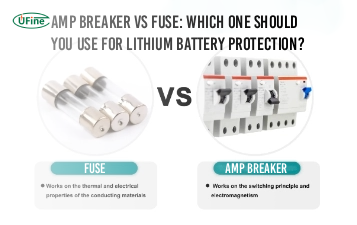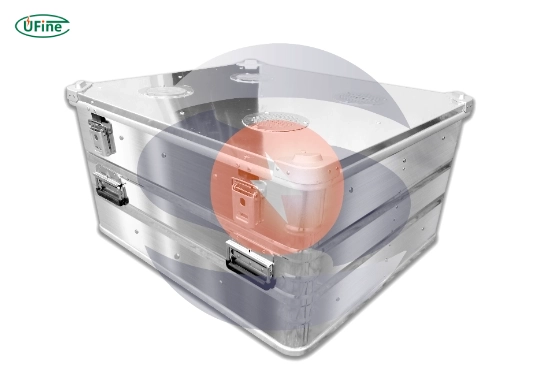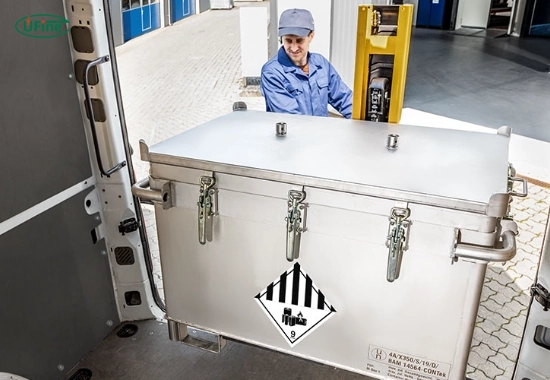
- Part 1. What is a battery storage box?
- Part 2. Why are lithium batteries different?
- Part 3. What are the key safety standards for battery storage boxes?
- Part 4. What materials are best for a battery storage box?
- Part 5. Should a battery storage box be ventilated?
- Part 6. What size battery box do I need?
- Part 7. How to install a battery storage box correctly?
- Part 8. What extra features should you look for?
- Part 9. Can I make my own battery storage box?
- Part 10. Where can I use a battery storage box?
- Part 11. FAQs about battery storage box
When using lithium batteries, having a battery storage box is not just a good idea—it is a safety requirement. A battery storage box protects your batteries from damage, reduces fire risk, and keeps your home or vehicle safe from accidents. So, what are the safety standards you need to know before buying or using one?
In this guide, we will cover everything about battery storage boxes for lithium batteries. We’ll look at how they work, why they are important, what materials are best, and what features to look for. Whether you’re storing batteries for your RV, solar system, or home backup, this article will help you stay safe and compliant.
Part 1. What is a battery storage box?
A battery storage box is a protective case designed to hold and secure batteries, especially lithium-ion types. It acts as a physical barrier between the battery and the outside environment.
The main purpose of a battery storage box is to:
- Prevent physical damage to the battery
- Reduce fire hazards in case of a thermal runaway
- Protect from water, dust, and extreme temperatures
- Organize and manage battery wiring and connections
These boxes are widely used in homes, camper vans, boats, and solar power systems.
Part 2. Why are lithium batteries different?
Lithium batteries are powerful and compact, but they are also more sensitive than other types like lead-acid. They can overheat, catch fire, or explode if not handled properly. That’s why storing them safely is critical.
Lithium batteries require:
- Stable temperatures
- Protection from punctures and impacts
- Ventilation for heat dissipation
- Fire-resistant enclosures
A good battery storage box provides all of these protections.
Part 3. What are the key safety standards for battery storage boxes?
When choosing a battery storage box, you should look for models that meet international safety standards. Here are the key ones to consider:
- UL 94
This standard tests how flammable the plastic material is. Look for boxes rated UL 94 V-0, which means they are highly flame-retardant. - IEC 62133
This is a global standard for the safety of lithium batteries. Boxes that meet this standard are built to protect against electric shock, fire, and explosion. - IP Rating
The Ingress Protection (IP) rating tells you how resistant the box is to dust and water. A rating like IP65 means it is dust-tight and protected against water jets. - UN 38.3
Though this applies more to battery transport, a box that meets UN 38.3 is generally built to handle physical stress like shock and vibration.
Part 4. What materials are best for a battery storage box?
The material of the box plays a big role in its safety.
- ABS Plastic: Lightweight, durable, and often flame-retardant.
- Steel: Very strong and offers high impact resistance, but heavier.
- Aluminum: Lighter than steel and still strong, also resistant to corrosion.
- FRP (Fiber Reinforced Plastic): Combines strength and lightweight design, often used in marine and RV applications.
Always choose a non-conductive, fire-resistant material for lithium battery storage.
Part 5. Should a battery storage box be ventilated?
Yes. Lithium batteries can heat up during charging or discharging. Proper ventilation helps manage heat and prevents gases from building up inside the box.
There are two main types of ventilation:
- Passive Ventilation: Small vents that allow airflow naturally.
- Active Ventilation: Fans or exhaust systems that actively move air in and out.
If your battery setup is high-capacity or in a warm area, choose a box with active ventilation for better safety.
Part 6. What size battery box do I need?
Choosing the right size depends on:
- Number of batteries
- Battery type and dimensions
- Additional components like BMS (Battery Management System), fuses, and cables
Always choose a box that allows extra space for airflow and future upgrades. A tight fit can cause overheating and make maintenance harder.
Part 7. How to install a battery storage box correctly?
A proper installation is just as important as choosing the right box. Here are the key steps:
- Choose a stable and dry location away from heat sources.
- Secure the box using brackets or straps to prevent movement.
- Connect the batteries using high-quality terminals and avoid loose wires.
- Install fuses and circuit breakers close to the battery terminals.
- Label all wires and ports for easy maintenance.
- Test the system before full use.
Do not install lithium batteries in sealed boxes without ventilation. This can cause heat buildup and increase the risk of fire.
Part 8. What extra features should you look for?
Some battery storage boxes come with smart features that make them safer and more convenient:
- Built-in BMS (Battery Management System)
- Digital monitoring screen
- Bluetooth or Wi-Fi connectivity
- Temperature sensors
- Automatic shutdown in case of overheating
These features may cost more but provide extra layers of protection and peace of mind.
Part 9. Can I make my own battery storage box?
Technically, yes. But it’s not recommended unless you have experience in electrical systems and safety standards.
DIY battery boxes often lack:
- Proper insulation
- Certified materials
- Correct ventilation
- Protection from short circuits
If you do want to build your own, make sure to:
- Use fire-resistant materials
- Include air vents
- Avoid metal-to-metal contact
- Add fuses and breakers
However, for most users, buying a certified battery storage box is the safer and smarter option.
Part 10. Where can I use a battery storage box?
Battery storage boxes are used in many situations. Here are the most common:
- Off-grid solar systems
- RV and campervans
- Marine boats
- Home battery backup systems
- Commercial energy storage
In all these cases, the main goals are safety, organization, and protection of your energy investment.
Part 11. FAQs about battery storage box
Do I need a battery storage box for lithium batteries?
Yes. A battery storage box protects lithium batteries from damage, fire, and environmental factors. It is a must-have for safety and performance.
Can lithium batteries catch fire if not stored properly?
Yes. Poor storage can lead to overheating, which may result in thermal runaway—a dangerous reaction that can cause fire or explosion.
Are all battery boxes waterproof?
No. Only boxes with a high IP rating (like IP65 or IP67) are waterproof. Always check the product specs before buying.
Can I store different types of batteries in one box?
It’s not recommended. Different batteries have different charging and safety needs. Mixing them can cause imbalance and safety risks.
How do I know if a battery box is safe?
Check for safety certifications like UL 94, IEC 62133, IP ratings, and fire-resistant materials. Also look for positive customer reviews and manufacturer warranties.
Related Tags:
More Articles

Amp Breaker vs Fuse: Which One Should You Use for Lithium Battery Protection?
Amp breaker vs fuse: breakers reset, fuses are cheaper but replaceable. Learn which is best for protecting your lithium battery system.
Is a LiFePO4 Car Battery Worth It Compared to Lead Acid?
Thinking about upgrading? See if a LiFePO4 car battery is the right replacement for your lead acid battery with clear pros and cons.
Demystifying 2S LiPo Battery: Your Complete Guide
Learn about 2S LiPo batteries! Perfect for beginners. Get all the info you need to fly safely. Read our guide now!
Who Are the Biggest Lithium Producers in 2025?
Explore the biggest lithium producers worldwide. See which countries and mining companies lead global lithium supply in 2025.
What Is an Amp Breaker and Why Is It Important in DC Power Systems?
An amp breaker is a safety device for DC systems. It automatically stops excessive electrical current to prevent fires, equipment damage, and system failures.




